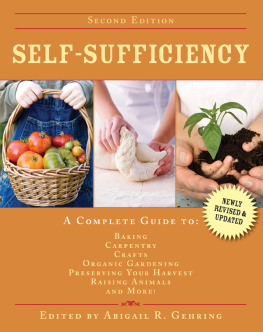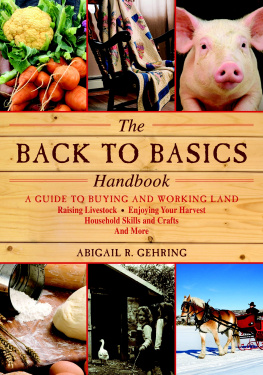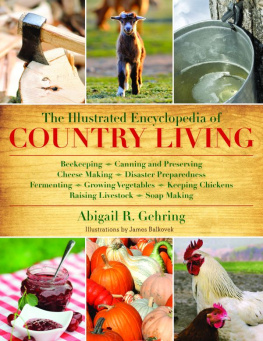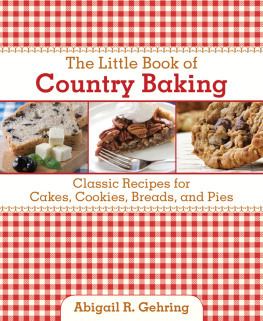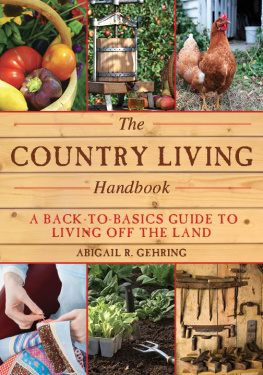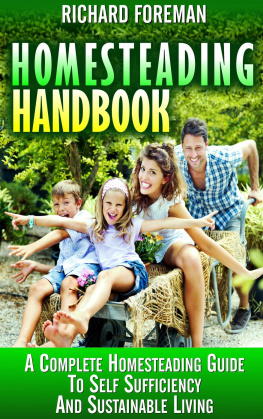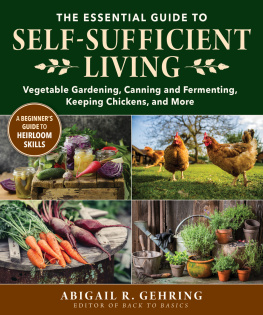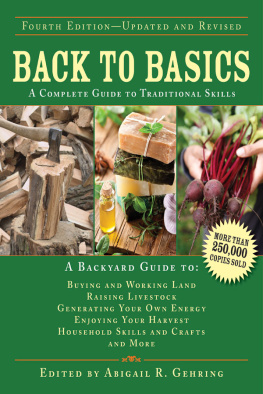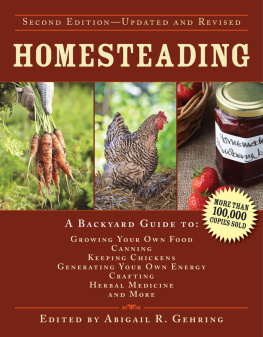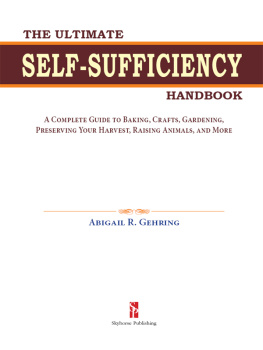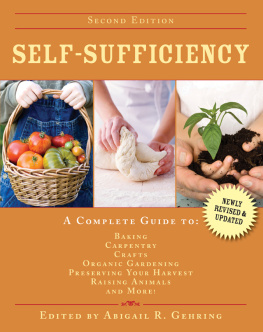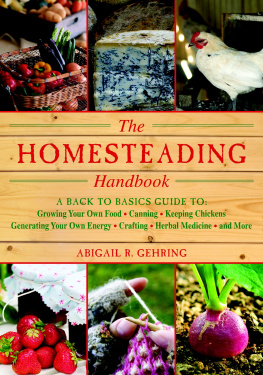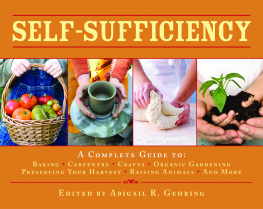Copyright 2015 by Abigail R. Gehring
All Rights Reserved. No part of this book may be reproduced in any manner without the express written consent of the publisher, except in the case of brief excerpts in critical reviews or articles. All inquiries should be addressed to Skyhorse Publishing, 307 West 36th Street, 11th Floor, New York, NY 10018.
Skyhorse Publishing books may be purchased in bulk at special discounts for sales promotion, corporate gifts, fund-raising, or educational purposes. Special editions can also be created to specifications. For details, contact the Special Sales Department, Skyhorse Publishing, 307 West 36th Street, 11th Floor, New York, NY 10018 or .
Skyhorse and Skyhorse Publishing are registered trademarks of Skyhorse Publishing, Inc., a Delaware corporation.
Visit our website at www.skyhorsepublishing.com
10 9 8 7 6 5 4 3 2
Library of Congress Cataloging-in-Publication Data is available on file.
ISBN: 978-1-63220-280-2
e-book ISBN: 978-1-63450-022-7
Printed in China

Contents

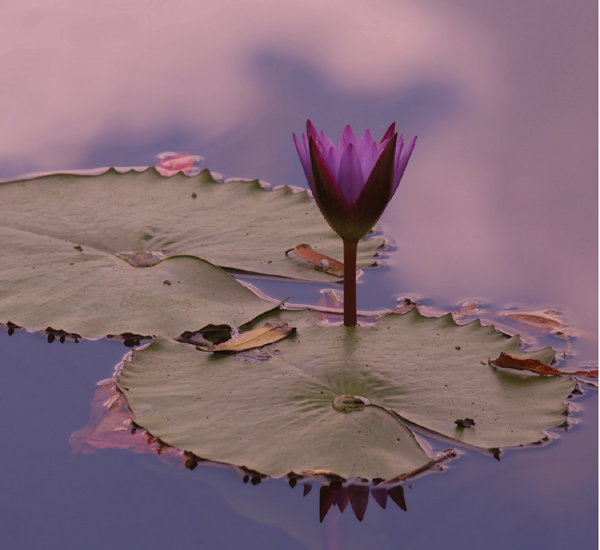
Introduction
More and more families are being drawn toward a lifestyle that is greener, cleaner, more genuine, and more aware. We want to know where our food is coming from, to the point of touching the dirt that it springs out of, if possible. We want our children (or nieces or nephews or godchildren) to understand that eggs come from chickensnot just from cardboard cartons on supermarket shelves. We love the idea of building things with our own hands, of picking our own berries, of making fresh bread and spreading it with homemade butter. We are, in short, longing for self-sufficiency.
Self-sufficiency as a term is somewhat misleading. The good life that most of us are seeking in our varied ways does not involve cutting off ties from those who surround us. Complete independence is not possible and, at least for most people, would not bring much satisfaction anyway. The early settlers banded together whenever they could, knowing their lives would be made easier and better by the communitys support. In similar ways, we benefit from those who have ventured into back-to-basics living before us, and we would be wise to share ideas, tools, and experiences with those on similar paths around us now. But we do not need to be trapped by dependency on anyone or any groupor any idea, for that matter. We can be responsible for growing or raising at least a portion of what we consume; we can find ways to fix things rather than running to the store to buy replacements; we can teach our children ourselves, rather than leaving the burden entirely on public or private schools.
People and experience are the best teachers when it comes to learning things like how to plant a garden or milk a cow. But sometimes you dont have a neighbor to call on for advice and trial and error will result in more error than the trial is worth. Thats where this book comes in. Youll find instructions and tips for everything from growing tomatoes to canning jams and jellies to constructing a chicken coop. Scattered throughout are fun projects for The Junior Homesteader and Homeschooling Hints, which can be used to supplement your childrens education, whether or not you choose to participate in a traditional schooling system. Youll also find plenty of photographs and illustrations to add clarity and interest to the written directions. Let these pages inspire and direct you as you discover what self-sufficiency means for you.
Part 1
The Family Garden

Planning a Garden

A Plants Basic Needs
B efore you start a garden, its helpful to understand what plants need in order to thrive. Some plants, like dandelions, are tolerant of a wide variety of conditions, while others, such as orchids, have very specific requirements in order to grow successfully. Before spending time, effort, and money attempting to grow a new plant in a garden, learn about the conditions that particular plant needs in order to grow properly.
Environmental factors play a key role in the proper growth of plants. Some of the essential factors that influence this natural process are as follows:
1. Length of Day
The amount of time between sunrise and sunset is the most critical factor in regulating vegetative growth, blooming, flower development, and the initiation of dormancy. Plants utilize increasing day length as a cue to promote their growth in spring, while decreasing day length in fall prompts them to prepare for the impending cold weather. Many plants require specific day length conditions in order to bloom and flower.
2. Light
Light is the energy source for all plants. Cloudy, rainy days or any shade cast by nearby plants and structures can significantly reduce the amount of light available to the plant. In addition, plants adapted to thrive in shady spaces cannot tolerate full sunlight. In general, plants will only be able to survive where adequate sunlight reaches them at levels they are able to tolerate.
3. Temperature
Plants grow best within an optimal range of temperatures. This temperature range may vary drastically depending on the plant species. Some plants thrive in environments where the temperature range is quite wide; others can only survive within a very narrow temperature variance. Plants can only survive where temperatures allow them to carry on life-sustaining chemical reactions.

4. Cold
Plants differ by species in their ability to survive cold temperatures. Temperatures below 60F injure some tropical plants. Conversely, arctic species can tolerate temperatures well below zero. The ability of a plant to withstand cold is a function of the degree of dormancy present in the plant and its general health. Exposure to wind, bright sunlight, or rapidly changing temperatures can also compromise a plants tolerance to the cold.
5. Heat
A plants ability to tolerate heat also varies widely from species to species. Many plants that evolved to grow in arid, tropical regions are naturally very heat tolerant, while subarctic and alpine plants show very little tolerance for heat.

This map shows the average number of days each year that an area experiences temperatures over 86 degrees (heat days). Zone 1 has less than one heat day and Zone 12 has more than 210 heat days. Most plants begin to suffer when it gets any hotter than 86 degrees, though different plants have different levels of tolerance.
6. Water
Different types of plants have different water needs. Some plants can tolerate drought during the summer but need winter rains in order to flourish. Other plants need a consistent supply of moisture to grow well. Careful attention to a plants need for supplemental water can help you to select plants that need a minimum of irrigation to perform well in your garden. If you have poorly drained, chronically wet soil, you can select lovely garden plants that naturally grow in bogs, marshlands, and other wet places.

